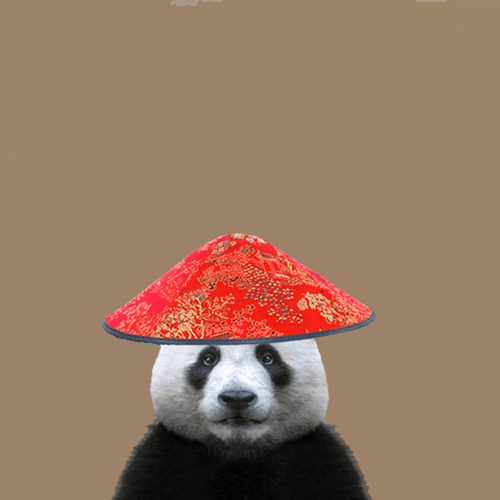In a quiet valley hidden deep within the mountains of Sichuan, there lived a panda named Bao, whose fur shimmered like morning snow and whose eyes carried the stillness of ancient wisdom. Unlike other pandas who spent their days lazily munching on bamboo, Bao was known among the villagers as a mysterious symbol of luck and prosperity. No one knew where he had come from—only that one day, he appeared at the edge of the rice fields wearing a small red hat adorned with golden threads that glowed softly under the sun.
The villagers, struggling after a year of failed harvests, took his arrival as a sign. The old monk of the mountain temple, Master Liang, declared, "This panda is no ordinary creature. He is a messenger of balance, sent by the heavens to restore fortune to those who live in harmony with the earth."
At first, few believed him. But when Bao began to wander the fields, something remarkable happened. Wherever his soft paws touched the soil, green shoots sprouted overnight. The rice grew tall and full, and the river that had dried to a trickle began to flow again. The villagers' despair turned into awe—and then gratitude.
Soon, they began to leave offerings of bamboo and fruit outside their homes. Bao never demanded worship, but each night he would visit one house, sitting quietly by the doorway. By morning, the family inside would awaken to find a small golden leaf resting where he had sat. Those who received it would see fortune follow—businesses thrived, loved ones healed, and lost travelers found their way home.
But Bao's magic came with a rule: his blessings only lasted for those who shared their good fortune with others. When greed crept in, his gifts faded like mist at dawn. One wealthy merchant, seeking to keep Bao for himself, built a golden cage lined with silk and filled it with the finest bamboo. He promised the panda eternal comfort—but Bao refused to eat. Within days, the merchant's storehouse burned in an unexplained fire, leaving only the cage untouched. When the villagers rushed to free Bao, the cage opened effortlessly, as though it had never been locked.
Bao simply looked at the merchant and bowed his head, his gaze neither angry nor cruel, only disappointed. "Fortune," said Master Liang, "cannot be owned. It must flow, as the river flows, or it turns to ash."
As years passed, Bao continued to roam the valley, blessing those who lived with kindness and balance. Generations grew old under his watchful eyes, and the village became known as the Valley of Prosperity, where no one went hungry and no soul was left behind.
One spring morning, Bao climbed to the highest peak and gazed upon the valley bathed in golden light. The villagers saw him lift his bamboo stalk to the sky before vanishing into the clouds.
They say Bao still watches from above, wearing his red hat of fortune, waiting to return whenever the world forgets that true luck begins not with riches—but with generosity.
